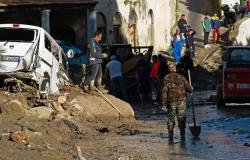With the lyric entitled “Domani”, the poet Francesco Potenza won the first edition of the “Marco Polo” Prize, conceived and promoted by the “Nuova Accademia dei Bronzi” association of Catanzaro, directed by Vincenzo Ursini, to remember the illustrious Venetian explorer 700 years after his death.
«The idea of promoting this prize – said Ursini – was born from the fact that poetry – as happened with the path of Marco Polo – represents an authentic “journey” within the soul of each poet, a journey interior in the depths of the soul.”
Born in Potenza on 17 July 1972, Francesco Potenza is a lawyer and freelance journalist. Always passionate about poetry and literature, he has published the volume of verses “Under the moon that happens”, the prosimeter “Fermatempo” and the collection “Baci nel Desert”. He has successfully participated in several poetry prizes and is present in numerous anthologies.
«“Tomorrow” is a text of great intensity and beauty which expresses with elegant compositional wisdom the awareness of the passage of time and the short duration of each moment, even the darkest ones exemplified by the night, emblem of many obscurities of the soul veiled by pain of memories and memories of lost moments”.
The awards ceremony will be held tomorrow 8 June, starting at 10 am, in the Church of the SS. Immaculate Conception and San Michele di Botricello. The president Vincenzo Ursini and the parish priest Don Rosario Morrone will greet the participating poets.
Dozens of poets from all over Italy will participate in the meeting, including: Agresta Bernardina, Aiello Velia, Alfano Anna, Amelio Biagio, Angotti Concetta, Angotti Rosy, Antonucci Erika, Basile Marisa, Berardinelli Palma Catia, Calabrò Nancy, Cantafio Angela Rita, Capria Francesco Saverio, Chiappetta Angelo, Ciancio Mina, Comi Luigi Gregorio, Conte Vincenzo, Cosco Paola, Costanzo Carmela, Cribari Giovanna, D’Amico Francesco, Demasi Stefania, Diodati Emilia, Fortina Manuel, Galati Giuseppe, Giallombardo Constantine, Giavelli Elena, Lapiana Pietro, Laugelli Maurizio, Marino Bruna, Mercuri Cesare Teodoro, Misasi Francesca, Munizza Salvatore, Nardo Domenico, Nicolazzo Silvana, Papaleo Rossana, Passalacqua Vittorio, Pedrini Maurizio, Pellegrinelli Monia, Petullà Michele, Pometti Pietro, Potenza Francesco, Romeo Antonella, Rotundo Rina , Saccà Ada, Sala Alessandro, Scaltrito Mara, Sparaco Assunta, Stillo Giuseppe, Tagliani Caterina, Talarico Maria Teresa, Turiano Giuseppa and Vespari Marco.
Together with Francesco Potenza, to whom the “Marco Polo” trophy will go, the poets will be awarded with Plaque of Honor: Aiello Velia for the lyric “Ladri di storia”, Bernio Mariella, for “Sui fili le rondini”, Caruso Vincenzo, with “La Parola”, Chiricosta Rosa, with “Salvifico path”, De Toffol Annalinda, with “A mia madre”, Erovereti Maria, with “La Borsa”, Fratto Nuccia Parrello, with “Come un girasole”, Galati Giuseppe , with “Ti parla ancora”, Iorio Gino, with “Sguardo”, Lamonaca Savino, with “Laureati”, Liberatore Elisabetta, with “Mia madre”, Malatacca Angela Maria, with “Dammi le parole”, Manca Marinella, with “Ardono words”, Martinetti Gianni, with “Fato”, Mazzamurro Francesco Maria, with “A mia madre…”, Minniti Giuseppe, with “I poeti”, Misasi Francesca, with “Emigrante”, Mollo Maria, with “Non Leaveci Sole”, Mormandi Giuseppina, with “Bastava”, Nardo Domenico, with “The rent”, Palazzesi Gianni, with “When I think of my father”, Pedrini Maurizio, with “Mi ordini in mente”, Petullà Michele, with “Notte dell’anima ”, Ranieri Anna Rachele, with “Il Buco”, Recchi Giuseppe, with “A mia madre Filomena”, Santoro Cinzia, with “Mistica” and Tagliani Caterina, with “Madre”. Plaques from the President will go to the poets: Alfano Anna, for “Sogno franto”, Autunno Ettore, with “Le mani”, Bambi Stefano, with “Nel silence”, Barraco Antonina, with “Il mio tempo”, Cantafio Angela Rita , with “A distant photo”, Capria Francesco Saverio, with “Se ti didice”, Crisapulli Paola, with “L’altra parte di me”, D’Amico Francesco, with “Friends of Man, enemies of Time”, Gerbino Salvatore, with “Abbraccio”, La Moglie Salvatore, with “Amo la parole”, Malavolti Massimo, with “Frammenti”, Nicolazzo Silvana, with “Verità liarda”, Scaltrito Mara, with “Sei in marzo da solo” and Vespari Marco, with “A golden life”.
Numerous other poets will receive an artistic medallion and a certificate with critical motivation.
After Ursini’s greetings, Professor Francesca Misasi, former school director in Vicenza and winner of numerous literary competitions including the “Alda Merini” Prize, will speak on the theme “Viaggi d’anime”: critical introductory speech to the volume “Italian Poets of the 21st century” published by the Bronze Academy with the aim of sending it free of charge to some of the most important national public libraries.
The artists Giovanni Chiarella and Ugo Rosanò will present the prizes, while Dr. Lucia Gatto, coordinator of the parish groups, will read the critical motivations of the winners. The musical interludes will be curated by Emilio Barone; the photo shoot will be ensured by Franco Foglia.
During the awards ceremony, the president of the Accademia dei Bronzi will deliver a Certificate of Honor, for their free participation in the association’s initiatives and their commitment in the field of literature, arts and cinema, to: Emilio Barone (“Ambassador ” Catanzaro of Italian music in the world”, Giovanni Chiarella, (“Master of color and landscape of the most beautiful Calabria”), Franco Foglia (“Authentic representative of contemporary photographic art”), Lucia Gatto (“For the qualified collaboration and great availability”), Paolo Milocco (“Excellent actor and director”), Francesca Misasi (“Valuable “voice” of new Italian poetry”), Ugo Rosanò (“Valid exponent of Catanzaro painting of our time”).
Marco Polo’s was an important journey that opened, in his time, new frontiers and unimaginable horizons. And it is precisely the symbolic value of that journey that inspired the Award. “An imaginary journey that of the poets – writes Misasi – which has ancient origins, or, if we want, from Homer’s Odyssey and the long and tormented journey of Ulysses which became a symbol of punishment but at the same time reward and exaltation of infinity of the human mind. It is impossible not to also mention Dante’s extraordinary Journey in that unparalleled masterpiece of the Divine Comedy, where the journey, a tortuous journey through the abyss of sin, becomes the acquisition of knowledge that leads to God. Again, among the most significant, the journey of Siddhartha (Herman Hesse), where the journey teaches the inestimable value of the unpredictability of life itself, of liberation from pain and the spiritual fulfillment of the soul. Or that journey through which one retraces life in a visceral and profound way as it was for Saint Augustine in his Confessions, to bring to light a different person, aware of his own mistakes and limits, a person who has done peace with oneself and with the awareness that, upon returning, one is no longer the same”. “And so: – concludes President Ursini – good poetry, and safe travels to all the poets of the Bronze Academy”.





